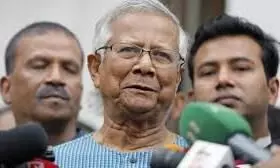
Bangladesh interim government led by Nobel laureate to take oath tomorrow
text_fieldsThe newly appointed interim government of Bangladesh, led by Nobel laureate Muhammad Yunus, is set to take oath tomorrow at 8 pm, as confirmed by the nation's army chief, General Waker-Uz-Zaman.
The advisory council under Yunus is expected to comprise 15 members.
President Mohammed Shahabuddin appointed Yunus (84) to head the interim government following the violent removal of former Prime Minister Sheikh Hasina, who was perceived as pro-India. General Waker expressed confidence in Yunus's ability to guide the country through a democratic transition.
In a televised address, General Waker stated, "He is very eager to do this. I am certain that he will be able to take us through a beautiful democratic process and that we will benefit from this."
Before boarding a flight at Paris' Charles de Gaulle airport bound for Dhaka, Yunus expressed his readiness to help the nation overcome its current challenges. "I'm looking forward to going back home, see what's happening and how we can organize ourselves to get out of the trouble we are in," he said. He also called for calm, emphasizing that violence would lead to further destruction.
The recent unrest has claimed at least 455 lives.
The decision to appoint Yunus was swiftly made after student leaders urged him to lead. The meeting included President Shahabuddin, military leaders, and student representatives. Nahid Islam, a leader from Students Against Discrimination, confirmed that Yunus will hold the title of chief adviser.
In related developments, a Bangladesh court acquitted Yunus of a labor conviction on appeal. His lawyer, Khaja Tanvir Ahmed, stated that the earlier conviction, which was widely criticized as politically motivated, has now been overturned. Yunus had initially been sentenced to six months in jail but was bailed pending appeal.
Former Prime Minister Sheikh Hasina, who had been in power since 2009, resigned amid mass protests demanding her departure.
The protests began over government job quotas but escalated into a broader anti-Hasina movement, culminating in her resignation and flight to India. The military, initially deployed to suppress the protests, ultimately turned against Hasina, leading to her ouster.























